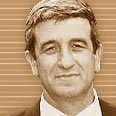
Moshe Elad
Syria, Egypt preaching to us?
Sometimes those who live in glass houses do throw stones
There's an old Arab saying: Those who live in glass houses shouldn't throw stones at the neighbors. Only absurd rules like those governing the United Nations can create a situation in which "enlightened" Arab countries not exactly known for their stellar performance on human rights are permitted to pass judgment on Israel on the same issues.
During latest debates to grace the UN in New York and Geneva, representatives of countries that should themselves stand trial preached and denounced Israel. The fact that this was permitted to occur is an embarrassment to the very idea of the UN.
Once again it has been proved that the stage provided by this cynical, anachronistic organization to representatives of these countries to sit in judgment – at the same time that they really belong in the witness box – is a mark of disgrace for Kofi Annan and his people.
Once again, the UN has lost a bit more of whatever credit it had left by allowing countries that not only have a clear conflict of interest in the matter to denounce Israel, but also have no idea what basic freedoms such as freedom of speech are all about.
Egypt, for example. Last week, President Hosni Mubarak criticized Israel for failing to respond to demands made by the Palestinian gang who kidnapped Cpl. Gilad Shalit. We can assume that Mr. Mubarak did not speak out because he is opposed to attacks on Israel or giving in to the kidnappers' blackmail.
The Egyptian president – no cynicism this time – is well known for his domestic war on terror. Who, better than he, knows how important it is to stand strong in the face of lowly terrorist gangs?
But once again, Mubarak acts according to his principle: That which is hateful to you, go ahead and do to others!
Egypt may have joined the international "Condemn Israel" choir, but he recently set a new standard for suppression of freedom of speech. Aliya Fraj Mujahad, a 15-year-old girl, wrote an end-of-year essay condemning Egypt's strong ties to the United States, and particularly Mujahad's criticism of Mubarak's strong ties to US President Bush.
For her efforts, she was arrested, interrogated for three hours, accused of "membership in a secret organization," and expelled from school.
Newspaper editor Ibrahim Issa was recently sentenced to a year in prison and a large fine. What was his crime? Publishing an article critical of the president. Such articles are acceptable throughout the free world, and in parts of the not-so-free world as well.
In Cairo, however, the piece was considered "insulting to the president in public."
Syria. The UN has awarded one of the world's worst human rights oppressors international standing in its organization.
Bashar Assad, the man behind the assassination of former Lebanese Prime Minister Rafik Hariri, recently ordered the arrest of dozens of human rights activists, saying they were no less than a "threat to Syria's national security" and accusing them of "cooperating with enemies of state."
Amongst the detainees were two well-known faces - Author Michel Kilo and lawyer Anwar el-Boni – who dared support the "Damascus-Beirut Declaration" calling for improved relations between the countries.
One might also mention the frequent arrests of "enemies of national security" in the Moslem Brotherhood.
Lebanon. Another enlightened country seeking to give Israel a lesson in how to deal with those suspected of subversion. Recently, a group of lawyers published an opinion accusing the government of holding dozens of political opponents in jail without trial and torturing them mercilessly.
Another self-righteous country to join the list recently was Yemen, a country in which attorney and human rights worker Khaled el-Anasi volunteered to defend Yemenite English-language journalist who belatedly published the Danish cartoons that caused all the furor earlier this year.
El-Anasi was threatened at gunpoint by government security forces and was forced to abandon his plans. Another journalist by the name of Abd el-Mahadr was shot by "anonymous elements" for writing an article critical of the government. And another human rights worker was jailed for three years for expressing "unacceptable" opinions."
It turns out that even if you throw stones despite living in a glass house, you've still got someone to defend you. The UN.
Brig. Gen. (res.) Moshe Elad was a senior IDF official in the territories and is now a researcher for the Shmuel Neeman Institute at the Technion










